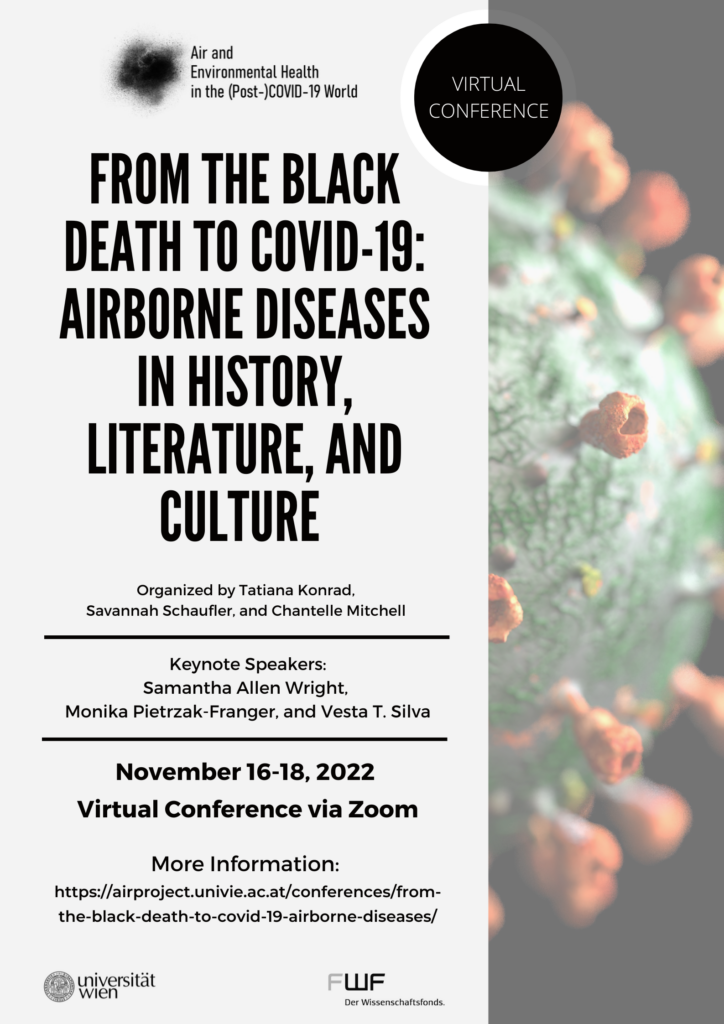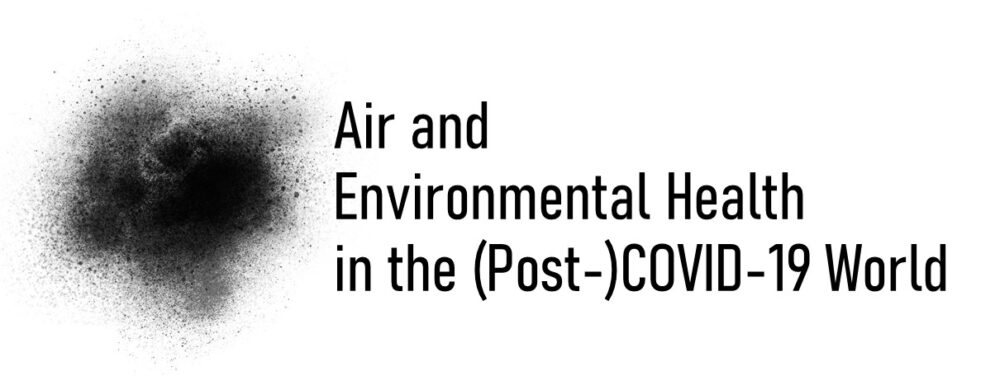Call for Papers (Deadline Extended)
Organized by Tatiana Konrad, Savannah Schaufler, and Chantelle Mitchell
University of Vienna
Conference Dates
Extended Submission Deadline
Venue
Keynote Speakers
November 16-18, 2022
May 1, 2022
Virtual via Zoom
Monika Pietrzak-Franger
(University of Vienna)
Vesta T. Silva
(Allegheny College)
Samantha Allen Wright
(William Penn University)

Created via Canva
The virtual conference “From the Black Death to COVID-19: Airborne Diseases in History, Literature, and Culture,” organized as part of the FWF project “Air and Environmental Health in the (Post-)COVID-19 World,” invites you to submit an abstract for consideration. The aim of this conference is to highlight health and medical perspectives on airborne diseases and pandemics, particularly in relation to their historical representation in Anglophone and postcolonial cultural and literary narratives. Presentations will take an in-depth look at how these representations can help us better understand the complex nature of air in connection to epidemics and pandemics. Topics of interest include Black death, Spanish flu, influenza, COVID-19 pandemic, disease and death, epidemics and war, vaccination, air pollution, and overall health and medical humanities perspectives on airborne disease. This conference will discuss the role of the humanities in addressing trapped life, social distancing, and the history of epidemics and pandemics. In this context, an epidemic is understood as a temporally and spatially limited increased occurrence of disease with a uniform cause in human populations. Unlike an epidemic, a pandemic is not spatially limited.1
Epidemics and pandemics are also recurring themes fictionalized in literary and cultural texts. Coping with such crises is illustrated through textual and figurative narratives and helps to express emotional and critical responses. Well-known cinematic and serial examples that depict pandemics and discuss the outbreak of a new airborne disease include Steven Soderbergh’s Contagion, Christian Alvart’s Sløborn, and Emily St. John Mandel’s Station Eleven. Russell T. Davies’ Years and Years discusses, among other things, what global impact the detonation of an atomic bomb has on the social life of a family. Stephen King’s The Stand tells the story of a world that must build a new form of order and society after an outbreak of a superflu. Also, comics deal with pandemics and epidemics and depict the coping, social distancing, and isolation figuratively. These include Budd Fisher’s Mutt and Jeff, Edwina Dumm’s Cap Stubbs and Tippie, and Dann Collins’ Sarszilla. These imaginaries often make important contributions to educating, edifying, and documenting the experience of dealing with the global challenges of epidemics and pandemics.2
The COVID-19 virus, which is primarily airborne, has led to a redefinition of the concept of human health, air in general, and air pollution in particular. As airborne diseases reflect an interaction between humans and their ecological environment, we would like to call for proposals that include topics from the health sciences and medical humanities perspective. This conference will trace the history of epidemic and pandemic disease, as well as airborne viruses. Air as such becomes a vehicle, as the transmissibility of viruses also to a certain degree results in and happens because of air pollution. The conference will address topics such as contagion and transmission, zoonotic diseases, infections, death, air, air pollution by viruses, social distancing in relation to history, media representations of disease and medicine, and vaccine controversies in an era of pandemics.
The purpose of this conference is to generate discussion among scholars, writers, and artists about the history of pandemics, the issues they raise, and the reflections (thinking, feeling, behaving) they provoke. Therefore, the event calls for a critical examination of medicine, ecology, crises, planetary health, and the future, and aims to demonstrate to the audience the urgency and importance of interdisciplinary research, with particular attention to the relationship between humans, history, health, and the environment.
We invite potential contributors to submit abstracts on the following topics (but not limited to):
- Historical perspectives on epidemics and pandemics
- (Airborne) pandemics in cultural and literary narratives (fiction and nonfiction)
- (Airborne) viruses and contagion
- Social distancing, isolation, and quarantine
- Airborne viruses and air pollution
- Environmental crisis and the emergence of (new) viruses
- Interrelationship between human and planetary health
- Vaccine controversies in an era of pandemics
This virtual conference aims to bring together national and international scholars working in the fields of health and medical humanities, environmental humanities, cultural studies, and history with different approaches to complex and multi-layered relationships between humans and the environment. Contributions that address normative issues of social and global justice in the context of airborne diseases are welcome. Scholars from the Global South are especially encouraged to apply.
Please email your abstract of 300 words and short bio (about 150 words) by May 1, 2022, to air.anglistik@univie.ac.at.
We expect to notify you of the acceptance of your abstract by Monday, May 9, 2022.
Submissions are required to be originals and should not have been previously published or be awaiting publication during the evaluation process for this conference.
Depending on the number and type of papers, conference proceedings will lead to some papers being included in a submission for a special issue of a journal. We are currently in the process of discussing a special conference issue with potential journals.
Click here to
download the CfP
This research was funded in whole, or in part, by the Austrian Science Fund (FWF) [10.55776/P34790].
1Merriam-Webster. “Pandemic.” Merriam-Webster.com dictionary. Accessed October 19, 2021. https://www.merriam-webster.com/dictionary/pandemic.
2 Saji, Sweetha, Sathyaraj Venkatesan, and Brian Callender. “Comics in the Time of a Pan(dem)ic: COVID-19, Graphic Medicine, and Metaphors.” Perspectives in Biology and Medicine 64, no. 1 (2021): 136–54. https://doi.org/10.1353/pbm.2021.0010.

